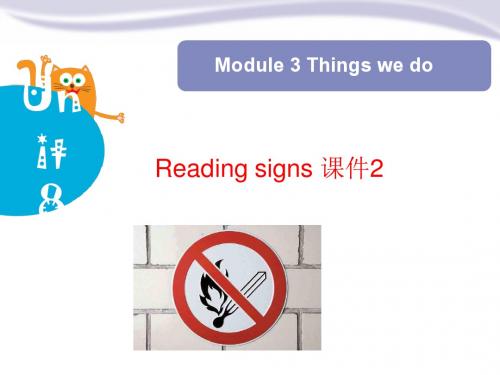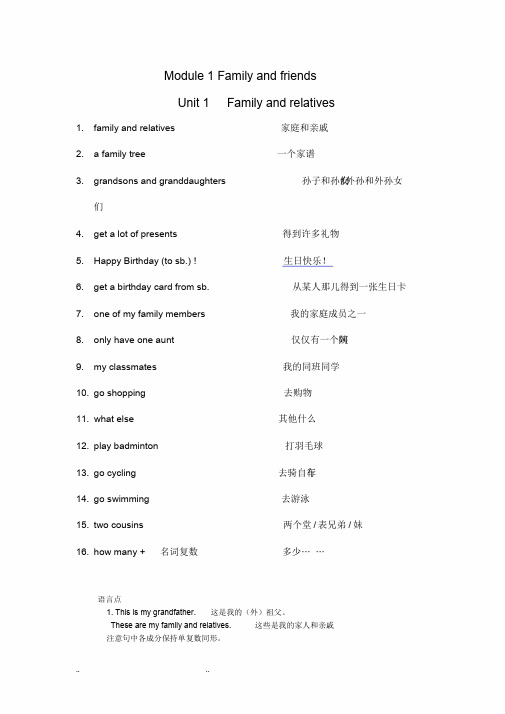2017-2018学年牛津上海版(深圳)六年级英语下册知识点总结
- 格式:doc
- 大小:100.50 KB
- 文档页数:7


Module 1 Family and friendsUnit 1 Family and relatives1. family and relatives 家庭和亲戚2. a family tree 一个家谱3. grandsons and granddaughters 孙子和孙女们/外孙和外孙女们4. get a lot of presents 得到许多礼物5. Happy Birthday (to sb.) ! 生日快乐!6. get a birthday card from sb. 从某人那儿得到一张生日卡7. one of my family members 我的家庭成员之一8. only have one aunt 仅仅有一个阿姨9. my classmates 我的同班同学10. go shopping 去购物11. what else 其他什么12. play badminton 打羽毛球13. go cycling 去骑自行车14. go swimming 去游泳15. two cousins 两个堂/表兄弟/ 妹16. how many + 名词复数多少⋯⋯语言点1. This is my grandfather. 这是我的(外)祖父。
These are my family and relatives. 这些是我的家人和亲戚。
注意句中各成分保持单复数同形。
17. I? m their son.. 我是他们的儿子。
We ? re their sons. 我们是他们的儿子。
18. How many uncles do you have? 你有多少个叔叔?How many 后面接可数名词的复数形式。
19. What do you do with your ⋯?你和你的⋯干什么?20. What else do you do with your ⋯? 你和你的⋯还干什么?21. What else do you do with your ⋯? 你和你的⋯还干什么?With 是个介词,后面接人称代词时,要用宾格的形式。




小学英语六年级下册Module 1 City life牛津上海版知识点练习第1题【单选题】In the past, most of the students to school on foot.A、goB、goesC、wentD、going【答案】:【解析】:第2题【单选题】People put on the safety belts before the plane takes off.A、mustB、canC、mayD、need【答案】:【解析】:第3题【单选题】—Where is your teacher?—He the post office.A、has been toB、has gone toC、goesD、went【答案】:【解析】:第4题【单选题】In the past, people candles to light their homes.A、useB、usedC、will useD、are using【答案】:【解析】:第5题【单选题】There are more than people in Shanghai.A、30 millionB、30 millionsC、million ofD、millions of【答案】:第6题【单选题】Do you enjoy pop music?A、listeningB、listening toC、listenD、listen to【答案】:【解析】:第7题【单选题】It takes about to travel from Shanghai to Hainan Island by plane.A、two half hoursB、two and half hoursC、two and a half hourD、two hours and a half【答案】:【解析】:第8题【单选题】In the past, people travelled to places by ship.B、the otherC、anotherD、others【答案】:【解析】:第9题【单选题】There are more than 5 students in the playground. The underlined part means "_______".A、aboutB、less thanC、overD、few【答案】:【解析】:第10题【单选题】—Would you like to go to the park?—A、Certainly, I"d like.B、Certainly, I"d like to.C、Certainly, I would.D、No, I don"t.【答案】:【解析】:第11题【句型转换】My mother will stay in Los Angeles for six years. (对划线部分提问) ____________will your mother stay in Los Angeles?【答案】:【解析】:第12题【句型转换】People eat rice dumplings to celebrate the Dragon Boat Festival. (对划线部分提问)____________people eat rice dumplings?【答案】:【解析】:第13题【句型转换】In summer, Jenny often has a swim in the sea. (保持句意基本不变) In summer, Jenny often____________in the sea.【答案】:【解析】:第14题【翻译】将下列词组翻译成英语一个咸粽子______很难过______有豆子的甜粽______没豆子的甜粽______没肉的咸粽______纪念屈原______给国王提建议______想要做某事______【答案】:无【解析】:第15题【选词填空(词汇运用)】Don"t drink______(toomuch/too many) wine. It"s bad for your health.【答案】:【解析】:第16题【连词成句】should, we, cinema, at, arrive, the, 10 a.m., before(连词成句) 【答案】:【解析】:第17题【语法填空】A lot of______come to Shanghai every year. (tourist)【答案】:【解析】:第18题【语法填空】Which______wouldyou like to take? (fly)【答案】:【解析】:第19题【语法填空】I often ask my parents to give me some______on study. (advise) 【答案】:【解析】:第20题【语法填空】I will send some______of my family to my good friend. (photo) 【答案】:【解析】:。
2Kung Fu Panda Pleasant Goat and Big Big Wolf 提示词:Have you been to .....? What’s your favourite food/place...... ? How long .... ?Beijing Hangzhou教学建议:此环节教案预期时间60分钟。
教学建议:1. 老师可以从引导的角度出发,让学生回忆之前学的知识,老师归纳和总结。
2. 每讲解完一组做一套相应的练习。
3. 可以以抢答的形式进行,不仅报出正确答案还要说出选这个答案的理由。
知识名称【知识梳理1】特殊疑问句I. 构成:疑问词+一般疑问句II. 疑问词:what(什么),who(谁),whose(谁的),which(哪个),when(何时),where(哪里),why(为何),how(怎样),how long(多久,多长时间),how far(多远),how often(多久一次),how soon(多久以后),how many(问数量-可数名词), how much(问价钱;问数量-不可数名词),how old(问年龄)等。
III. 解题步骤:根据划线部分确定疑问将句子变作一般疑问句去划线部分加问号【巩固练习】1. The eighty-year-old man looks happy and healthy.(对划线部分提问)肯定式:主语+have/has +过去分词+其它否定式:主语+have/has+not+过去分词+其它一般疑问式:Have/Has +主语+过去分词+其它?2. 现在完成时的用法一: 表示过去发生或已经完成的某一动作对现在造成的影响或结果。
此时,常与时间副词already(已经),yet(还、已经),just (刚刚、仅仅),ever(曾经),never(从不),before(以前)等连用。
3.现在完成时用法二: 持续性用法(肯定句,疑问句中谓语动词必须是延续性动词)表示过去已经开始,持续到现在的动作或状态。
总复习要点1 一.句子汇总 1. 否定句标志:not, no, n’t,“不”。
2. 特殊疑问句必用疑问词。 疑问词:what什么, who谁, whose谁的, which哪个, when什么时候, why为什么, where哪里, how怎样, how often多常, how long多长, how far多远, how old多少岁,how many多少, how much多少钱。
3. 一般疑问句
①Be…(Am/Is/Are/Was/Were …? ) 肯定回答:Yes, … is/are/was/were. 否定回答:No, … isn’t/aren’t/wasn’t/weren’t. 如:1. --Was there a subway 50 years ago?50年前有地铁吗? --Yes, there was.是的,有。 --No, there wasn’t.不,没有。 2. -- Am I wrong?我错了吗? 肯定回答:-Yes, you are. 否定回答:-No, you aren’t. ②--Do/Does/Did …? 肯定回答:Yes, … do/does/did.
肯定句 例句 否定句 例句 一些 some I have some books. 我有一些书。 any I don’t have any books.
我没有一些书。 也 too I like orange, too. 我也喜欢橘子 either I don’t like orange, either.
我不喜欢橘子。 和 and You should shake hands and say “Hello”.你应该握手和打招呼。 or You shouldn’t push or run. 你不应
该推挤和跑。 否定回答:No, … don’t/doesn’t/didn’t. 如:Did you find something?你找到什么东西了吗? --Yes, I did.是的,我找到了。 --No, I didn’t.不,我没找到。 ③—Can/Could/Will/Would/Shall/Should/Must/May…? 肯定回答:Yes, …. can / could/will/would/shall/ should/must/may. 否定回答:No, …can’t / couldn’t/ won’t/wouldn’t/shan’t/ shouldn’t /needn’t/ mustn’t. 如:-Can we talk to Grandma?我们能和奶奶说话吗? --Yes, we can.是的,我们能。 --No, we can’t.不,我们不能。 4. 反义疑问句 ①前肯定,后否定。例:He can swim, can’t he? ②前否定,后肯定。例:He can’t swim, can he? 二. 语法汇总
名词 可数名词 单数 a + 辅音字母或发音 an+元音字母(a,e,i,o,u)或元音发音 a boy; a girl an hour; an apple
复数
直接加s desk-desks, day-days 以s, x, ch, sh,结尾,加es bus-buses; box-boxes, watch-watches; fish-fishes 以辅音字母+y结尾,把y改I,再加es party-parties; family-families 以辅音字母+o结尾,加es potato-potatoes; tomato-tomatoes 例外:photo-photos; piano-pianos. 以f, fe结尾,把f, fe改v,再加es knife-knives; life-lives 不规则变化 child-children; man-men; woman- women; foot-feet; goose-geese(鹅); tooth-teeth; mouse-mice(老鼠);people-people人; 不可数名词 不能按个数来计算的名词。没有复数。如:money, time;液体:water; coffee; juice...;细碎的东西:hair, 用法: 1. 人称代词的主格在句中作主语,宾格在句中作宾语。主语是句中描述的人或物,放在动此前;宾语是动词或介词所指向的对象,放在动词或介词后 如:I am learning English. (作主语) 我在学习英语。 We are waiting for them. (作宾语) 我们在等他们。
2. 形容词性物主代词+名词,名词性物主代词不加名词。形容词性物主代词+名词=名词性物主代词。如: ①My father is a teacher. (my是形容词性物主代词,后面必加名词) 我的爸爸是老师。 ②This is my homework. That is yours. ( yours是名词性物主代词,后面不加名词,等于“your homework”.) 这是我的作业。那是你的(作业)。
3. by+反身代词 意思是“亲自,独自”。 如:I do my homework by myself. 我独自做作业。
4. “某人的”用“’s” ,表示所属关系。如:汤姆的-Tom’s, 我妈妈的—my mother’s。用法如下
第一人称 第二人称 第三人称 单数 复数 单数 复数 单 数 复 数
人称代词
主格
I 我 we 我们 you 你 you 你们 he他 she她 it它 they 他们
宾格
me 我 us 我们 you 你 you 你们 him他 her 她 it 它 them 他们
物主代词 形容词性
my 我的 our 我们的 your 你的 your 你们的 his 他的 her 她的 its 它的 their 他们的
名词性
mine 我的 ours 我们的 yours 你的 yours 你们的 his 他的 hers 她的 its 它的 theirs 他们的
反身代词 myself 我自己 ourselves 我们自己 yourself 你自己 yourselves 你们自己 himself他自己 herself她自己 itself它自己 themselves 他们自己 连词 用法 意思 例句 and 并列关系 和 I brought sweet and sour pork. 我买了酸甜猪肉。 but 转折关系 但是 Mary likes spicy food but she doesn’t like sour food.玛丽喜欢辣食但不喜欢酸食。 so 因果关系 所以 I like vegetables so I brought vegetable soup.我喜欢蔬菜所以我带来了蔬菜汤。 because 因果关系 因为 I brought 4 apples because I like eating apples. or 选择关系 或者 I need some water or juice.我需要一些水或果汁。
介词(at, on, in, to, of, from, about, for, after, before, up, down, under,
near, between, by, over,out,off, with)后加n. 或v-ing。 1. at 的固定搭配 at first首先—at last最后,at the weekend在周末,at the top of…在…顶部, look at看着, at school在学校, at home在家,at Christmas在圣诞节,at war在战争中,at+具体时刻(at 11:00在11点),
2.on的固定搭配 on holiday在度假, on duty在值日, on foot 步行,on time准时, put on穿上, turn on开(灯,电视,电脑),on the earth在地球上, on the left/right在左/右边, get on上车,hold on请稍等,
3.in的固定搭配 in time及时, in the morning/afternoon/evening在早上/下午/晚上, in the past/future在过去/未来, in English用英语, in bed在床上,in the end最后, in this way用这种方法, in +地点(in Shenzhen在深圳), in+月份(in May在五月),in+季节(in summer在夏天),in space在太空里
4. to的固定搭配 be going to…将, go to去, listen to听, talk to…向…说话, near to…靠近, come to来, write to写信给…, from…to…从…到…, walk to…走路去…, the way to…去…的路, take…to…带到…, give…to…给…, have to不得不,add…to…添加…到…
名词所有格 (名词后加’s 表示所属关系) 单数名词直接加’s the boy’s schoolbag 男孩的书包 my father’s watch我爸爸的手表 复数名词已有s, 加[’] the boys’ schoolbags男孩们的书包 the teachers’ office老师们的办公室 复数名词没有s, 加’s Women’s Day妇女节 Children’s Day儿童节
几个人共有一样东西,只需在最后一个人后加’s Jim and Tom’s bedroom 吉姆和汤姆的房间 (两人共有)
各自拥有的东西,每个人后都要加’s Jim’s and Tom’s bike (吉姆和汤姆的自行车) (各自都有)